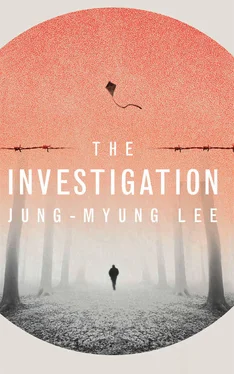At first he did not want to believe that a long life could be spent forming the first, short, false sentences that are without meaning.
One long-ago autumn day, crouched in the corner of our dust-filled bookshop, I was caught by a raging fervour for literature that I had not been able to shake off. That night, as we walked home, my mother had told me about a young Korean man who’d asked her to reserve for him a copy of The Notebooks of Malte Laurids Brigge if it came in. Thinking about the copy I had hidden deep in the bookshelves, I felt a small pang of guilt and a slight relief. After I enlisted in the military, my mother, finding that copy, would have remembered the Korean student. And she would have handed him the book that carried her son’s fingerprints. This old book linked us. It was an implausible coincidence; we loved the same poet and the exact same book, almost as though we were in love with the same girl.
Dong-ju pushed it towards me. ‘You can have it.’
I turned the pages one by one. This book had come to me from some stranger and stayed with the young poet before returning to me. Rilke’s words had wandered through the world, embracing and healing damaged spirits. That night, the world became a little more beautiful.
Dong-ju’s memories were fleeting. He murmured to himself in Korean as we walked towards the interrogation room. He was trying his hardest to cling to the words that were attempting to desert him. Snow fell silently outside.
‘Can I rest for a while?’ he asked.
‘Certainly,’ I said.
He looked into his reflection in the window. ‘The snow blankets everything in white.’ He started walking slowly again, murmuring in Korean.
The heavy chain dragged along, pressing down on my soul. Dong-ju accidentally took the wrong corridor. Had he forgotten this familiar route? At our destination I had to grab his shoulder to stop him; he would have continued to walk past the interrogation room. The room was freezing. It didn’t seem to bother him, though; he opened his mouth as soon as he sat down, perhaps fearing that the words in his head might die there and vanish without a trace.
‘“Another Morning at the Beginning of the World.” The snow blankets everything in white / And the telephone pole weeps / conveying God’s words. / What revelation is forthcoming? / When spring comes / Quickly / I sin / And eyes / Are bright. / After Eve finishes the hard work of delivering a baby / She will hide her nakedness with a fig leaf and / I will have to sweat, beading on my forehead.’
I was struck dumb — original sin was reflected against a pure sense of self and a bleak situation. I could feel Dong-ju’s powerful will for life, the will to construct his own reality. His emotive poem drew out deep feelings within me; perhaps the more so because he recited the words in a calm, low voice. I put down the pen and lobbed my nightly questions at him. ‘What’s your name?’ ‘Where is your home town?’ ‘What’s the date today?’ ‘When will you be released?’ ‘What words can you think of now?’ I didn’t ask for his prisoner number or his Japanese name and I didn’t make him recite the multiplication tables again. Those questions polluted and ruined his memories. He deserved to recall happier times.
‘In the winter, white snow covered the village, and the deer and boars came as if they were guests, looking for food. The children flew kites that filled the sky, and the adults hunted falcons. I lived in a large, traditional tile-roof house near the school. We had a plum tree in our yard, an orchard of apricot trees in the back, and a large mulberry tree and a deep well outside the east gate. Oh, the mulberries were so sweet! I would shout into the well to hear the echo and raise my head, and see the sunlight on the far-away cross atop the church belfry. I took long walks, crossing the stream into the forest, climbing the hill towards the village, on paths that were lined with dandelions, where magpies flew overhead, where I passed young ladies, feeling the breeze. ’ His eyes were dreamy.
I remained quiet, unwilling to break his reverie. Memory had to be like a muscle: the more it was used, the stronger it must become.
He struggled to raise his eyes to meet mine. ‘Yuichi — Watanabe Yuichi!’ he called out.
‘Yes?’
He smiled. I realized he’d just wanted to utter my name before it, too, disappeared, before he ceased to recognize me. He was fighting a fierce battle in a war he would end up losing. He recited Shakespeare and Tolstoy and Rilke and Jammes constantly. He began talking ceaselessly, about his home town, his school days, literature, music and artists. Before, I used to ask him questions and he would answer, but now he talked and I listened. Watching him desperately cling to the last of his memory sent pangs through my heart. Since he no longer trusted his own mind, he was trying to move his memories into mine. ‘Have you seen Van Gogh’s paintings? Starry Night or Cafe Terrace at Night ?’ he suddenly asked.
I had seen pictures of those paintings; I’d cherished a book of Van Gogh paintings in colour that we had at the bookshop. ‘Van Gogh was the artist of stars,’ Dong-ju said. ‘He loved stars and loved painting them. He wrote to his brother Theo about them, too. Listen to this.’ He took a few shallow breaths. ‘“But the sight of the stars always makes me dream in as simple a way as the black spots on the map, representing towns and villages, make me dream. Why, I say to myself, should the spots of light in the firmament be less accessible to us than the black spots on the map of France? Just as we take the train to go to Tarascon or Rouen, we take death to go to a star. What’s certainly true in this argument is that while alive, we cannot go to a star, any more than once dead we’d be able to take the train. To die peacefully of old age would be to go there on foot.”’ He looked anxious.
I knew he was having difficulty sleeping; his insomnia made him more agitated. I led him to the underground library, hoping it would lift his mood.
Dong-ju looked around the dimly lit space. ‘I’d hoped you wouldn’t find out about this. It’s too dangerous.’
‘But I did,’ I said, my voice crackling with fear. ‘I don’t know what to do. If anyone finds out, none of us will be safe.’ I regretted not running to Maeda the minute I’d discovered that dank underground space. It was too late, though, and now I could only live with the anxiety. Dong-ju grabbed my shoulders. ‘Even if it’s discovered at some point, you don’t know anything about it.’
‘You’re not going to implicate me?’
‘Even if I wanted to tell everyone, I won’t remember. Soon enough I won’t even remember this moment.’ He smiled bitterly and traced a finger down the spine of each book, as though to engrave the title forever in his head.
‘Soon these titles will vanish from my mind. As though I’d never heard of them. At some point you’ll have to tell me that I once read such beautiful books.’ His breath, visible in the cold, drifted around his pale face.
Each time he let out a breath, it was as though his soul were escaping.
Dong-ju recited another poem from memory. ‘“Hospital.” Shielding her face with the shadow of the apricot tree, lying in the back yard of the hospital, a young woman reveals her pale legs under her white gown and sunbathes. Not even a butterfly visits this woman suffering from tuberculosis. There is not a breeze against the not-unhappy tree.
// I came to this place for the first time after suffering for a long time from an unknown pain. But my old doctor does not know the illness of my young self. He says I am not ill. This excessive hardship, this excessive fatigue; I must not become cross. // The woman gets up and straightens her clothes and picks a marigold from the garden to place on her breast and disappears into the hospital. I wish for her health — as well as mine — to recover quickly; I lie down where she lay.’
Читать дальше












